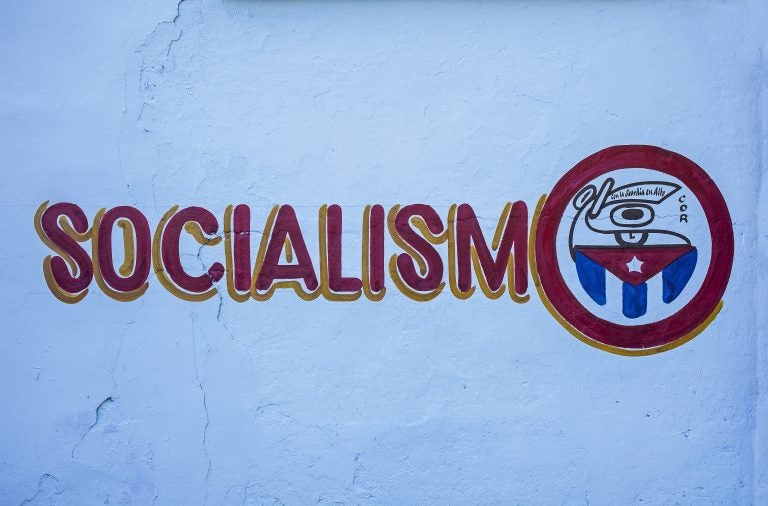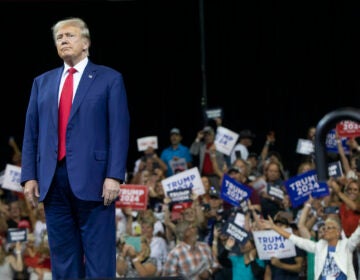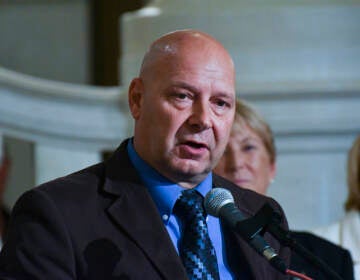Trump’s fright-wing freakout about ‘socialism’
Did you catch Trump's 2020 campaign message, lodged deep within the State of the Union speech? "Here in the United States, we are alarmed by new calls to adopt socialism."

Political propaganda, painted on a street wall, La Habana, Cuba (Lucas Vallecillos/VWPics via AP Images)
Did you catch Trump’s 2020 campaign message, lodged deep within the State of the Union speech? “Here in the United States,” he said, “we are alarmed by new calls to adopt socialism in our country. America was founded on liberty and independence, not government coercion, domination, and control. We are born free and we will stay free. Tonight, we renew our resolve that America will never be a socialist country.”
He has conjured that bogeyman before — in Tennessee, on the eve of the midterms, he lied that Democrats “want to impose socialism on our country” — and it’s easy to see why. He has virtually no achievements to run on (assuming he even runs again; I’m not 100 percent convinced), particularly now that his one purported success, the tax cut law, turns out to be screwing people on their refunds. Which leaves him with the tactic he knows best: scaring people.
Hence his decision to stoke baseless fears of “socialism.” I have no doubt that his 35 percent base will tremble on cue, conflating liberalism with socialism with communism with totalitarianism, but any semi-cognitive human knows darn well that, in a real socialist system, the government owns and controls the means of production. Not a single Democrat, not even Bernie Sanders or Alexandria Ocasio-Cortez, wants the government to own and control the means of production.
As the right-leaning commentator Stephen Chapman points out, “Even European social democracies understand that capitalists and markets are indispensable. There is no constituency in America for nationalizing factories, financial institutions, or farms.” Trump will smear all Democratic proposals — higher taxes on the rich, gun reform, expanded health care — as “socialism,” but Chapman mocks that tactic: “To warn of the onslaught of socialism in response to any proposed government initiative is to expose your intellectual bankruptcy.”
Conservatives made that titanic mistake more than 50 years ago when they agitated against a federal proposal to guarantee health care to the elderly. The plan that came to be called “Medicare” was equated with “socialism,” and the charge was led by an actor named Ronald Reagan. He warned in 1961 that if this Medicare idea became law, the government would dictate to doctors where they’d be allowed to practice. If that kind of socialism took hold, “you and I may well spend our sunset years telling our children and our children’s children what it once was like in America when men were free.”
Well. I’d love for Gallup to ask today’s elderly Americans — especially conservative elderly Americans — whether they feel enslaved in their sunset years by the health care safety net. I wish Gallup would determine what percentage of conservative elders have refused Medicare coverage on principle, in the name of freedom and liberty. And by the way, when that aforementioned actor was president during the ’80s, he signed legislation that raised taxes in order to better fund Medicare and signed legislation to expand the benefits of Medicare.
Trump’s State of the Union declaration — “we are born free, and we will stay free” — sounds a lot like Reagan ’61. But it turns out that we’re only the 17th freest nation in the world, according to the latest report co-published by the libertarian Cato Institute and the Fraser Institute. Turns out, the freest nation is New Zealand. And it just so happens that New Zealand has single-payer national health care.
Granted, there’s always the chance that the new crop of Democratic candidates and congressfolk — some of them, anyway — will tack too far left for the American middle. “Medicare for All,” which means different things to different candidates, could turn off people who like their private coverage and give Trump rhetorical ammo for a “socialism” mantra. But, more broadly speaking, and given all of Trump’s dead-weight baggage, it’s debatable whether he can succeed. There’s landslide majority support for government-backed health care that would compete with private payers, and landslide support — 76 percent ”— for higher taxes on the rich, as a way to reduce income inequality.
Indeed, the fright-wing freakout about “socialism” likely has little salience in our current era; the Trump-GOP plutocracy has widened the gap between the rich and everyone else and has done nothing for the anxious middle class. Trump at this point is arguably the worst person to champion capitalism and equate it with freedom. Perhaps most significantly, the ascendant voters in the electorate — ages 18 to 29 — are increasingly skeptical about capitalism; according to Gallup, only 45 percent of young adults view capitalism positively; in 2010, that share was 68 percent.
This doesn’t mean that young adults, or Democrats in general, want the government to own the means of production. What virtually all the 2020 Democratic candidates want, with varying degrees of emphasis, is capitalism with serious guardrails, a free market economy with a strong safety net.
That isn’t much different than what Franklin D. Roosevelt sought more than 80 years ago with his New Deal — for which he was smeared in the manner resurrected by Trump. A Pennsylvania Republican congressman, Robert Rich, said in 1935: “Roosevelt is a socialist, not a Democrat.” An Ohio Republican senator, Simeon Fess, said in 1934: “The president’s recent statements remove any doubt of his policy of state socialism.” That rhetoric failed then; I question whether Trump can succeed with it now.
Capitalism with guardrails is a not “socialism” in the classic sense. It’s simply common sense.
WHYY is your source for fact-based, in-depth journalism and information. As a nonprofit organization, we rely on financial support from readers like you. Please give today.




